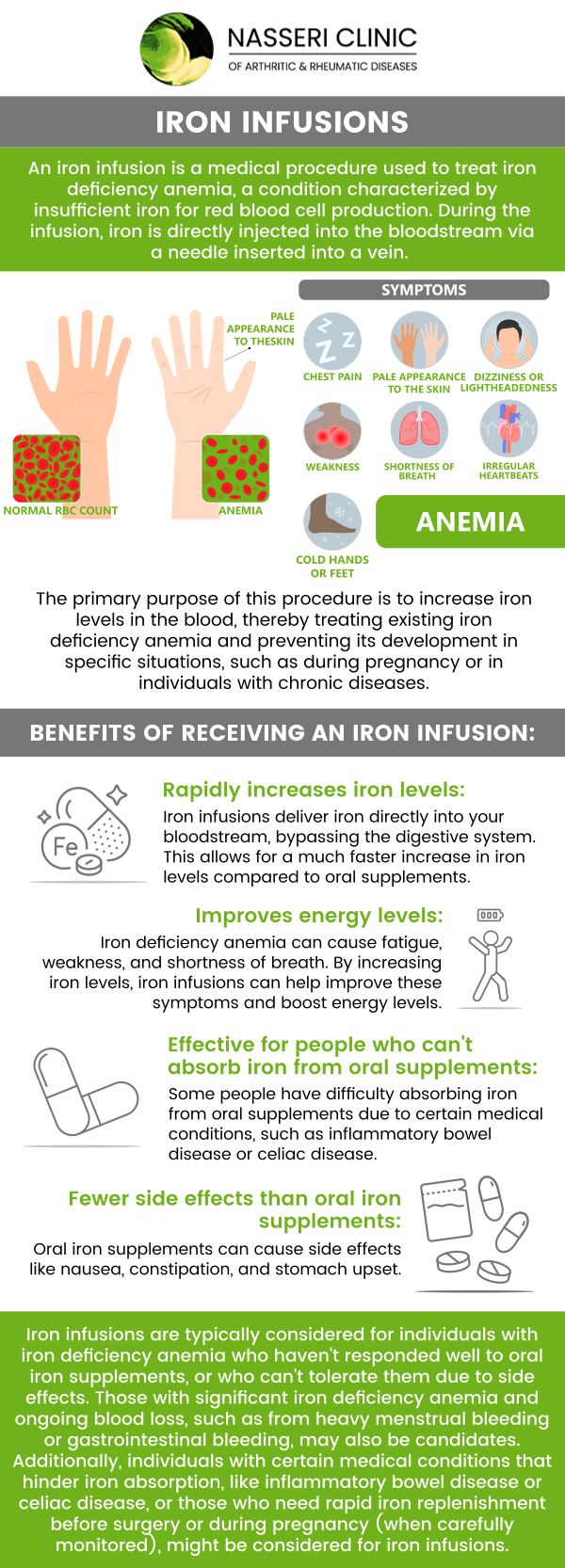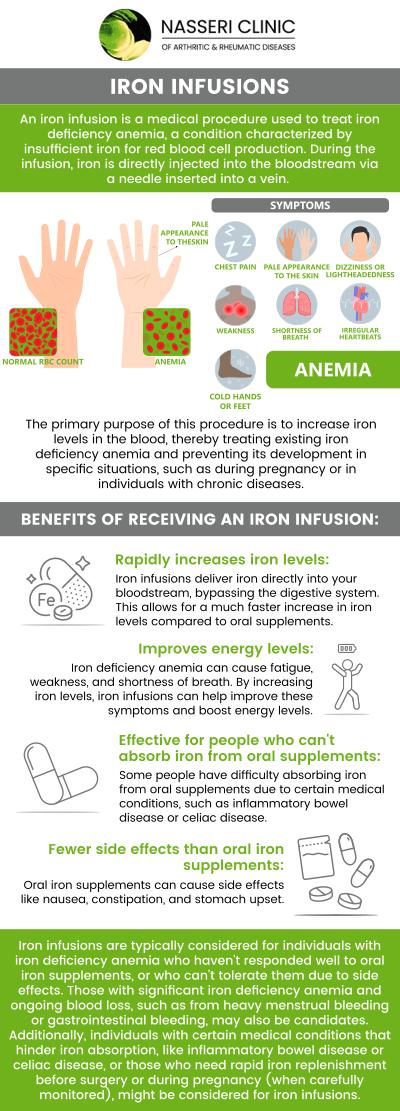Iron Deficiency: Identifying the Signs and Causes of Anemia
If you’re experiencing symptoms of iron deficiency, such as fatigue, weakness, or shortness of breath, Dr. Nasseri, MD, and his team offer effective treatment options. For patients with underlying rheumatic conditions, we integrate iron deficiency treatment with your overall care plan to improve your health and quality of life. For more information, contact us or book an appointment online. We have convenient locations to serve you in Rosedale, Columbia, Glen Burnie, North Baltimore, Edgewater, and Catonsville MD.




Table of Contents:
What is iron-deficiency anemia?
How does iron-deficiency anemia affect my body?
How does iron-deficiency anemia develop?
What are the symptoms of being deficient in iron?
Iron-deficiency anemia occurs when the body lacks enough iron to produce hemoglobin, the protein in red blood cells that carries oxygen. This leads to insufficient oxygen reaching tissues and organs, causing symptoms like fatigue, weakness, and dizziness.
At the Nasseri Clinic of Arthritic and Rheumatic Diseases, our team recognizes that patients with rheumatic conditions like rheumatoid arthritis (RA) are at higher risk for iron-deficiency anemia. Chronic inflammation can affect iron metabolism and absorption, while medications like NSAIDs may cause gastrointestinal bleeding, further contributing to iron loss.
The symptoms of anemia often overlap with those of rheumatic diseases, making diagnosis challenging. Therefore, comprehensive evaluation, including blood tests and a review of medical history, is essential. Treatment involves addressing both anemia and the underlying rheumatic condition. This may include iron supplements, dietary changes, and appropriate management of inflammation.
Regular monitoring of iron levels is crucial for patients with chronic inflammation or those on long-term NSAIDs to prevent or manage iron-deficiency anemia effectively.
Iron-deficiency anemia occurs when the body lacks enough iron to produce hemoglobin, which is essential for oxygen transport. This condition is particularly impactful for patients with arthritis and rheumatic diseases, as it can worsen fatigue and muscle weakness, already common symptoms of these conditions.
Efficient oxygen delivery to tissues is vital for joint health and reducing inflammation. In patients with arthritis, anemia can exacerbate fatigue, making physical activity more difficult and further affecting joint mobility. Impaired oxygen transport can lead to tissue hypoxia, worsening joint pain and stiffness, especially in conditions like rheumatoid arthritis.
Iron also plays a key role in cellular energy production and immune function. Anemia reduces the body’s energy efficiency, complicating symptom management and increasing susceptibility to infections. Additionally, the combined effects of chronic pain, fatigue, and anemia can negatively impact cognitive and emotional well-being, exacerbating mental health challenges faced by patients with rheumatic diseases.
Given these complexities, timely diagnosis and management of iron-deficiency anemia are crucial for improving quality of life. Regular monitoring and treatment are essential for patients with chronic inflammation or those on long-term medications like NSAIDs.
Iron-deficiency anemia occurs when the body lacks enough iron to produce hemoglobin, leading to symptoms like fatigue, weakness, and shortness of breath. At the Nasseri Clinic of Arthritic and Rheumatic Diseases, we recognize that patients with chronic inflammatory conditions, such as rheumatoid arthritis, are at higher risk for anemia. Chronic inflammation affects iron metabolism, while medications like NSAIDs can cause gastrointestinal bleeding, further contributing to iron loss.
Rheumatic diseases can also increase the body’s demand for iron, making it harder to maintain adequate iron levels. Additionally, conditions like celiac disease or Crohn’s disease may impair iron absorption, complicating treatment.
To effectively manage iron-deficiency anemia in these patients, we take a comprehensive approach that includes assessing diet, medication use, and sources of blood loss. Our tailored treatment services may involve dietary changes, iron supplements, and adjustments to medications to minimize side effects and improve overall health. If you’re experiencing symptoms of anemia and have a history of rheumatic disease, a thorough evaluation can help address both issues effectively.
At the Nasseri Clinic of Arthritic and Rheumatic Diseases, we recognize the significant impact of iron deficiency on patients with rheumatic conditions, as the two can exacerbate symptoms and complicate treatment. Understanding the relationship between iron deficiency and rheumatic diseases is crucial for comprehensive care.
Fatigue is a common symptom in rheumatic diseases, and iron deficiency can intensify this, making it essential for clinicians to monitor iron levels in patients experiencing increased fatigue. While joint pain isn’t directly caused by iron deficiency, the fatigue and weakness associated with anemia can heighten the perception of joint pain, complicating diagnosis and treatment.
Pale skin and mucous membranes may indicate iron deficiency, particularly in patients already dealing with skin changes from their rheumatic condition. Additionally, anemia can lead to shortness of breath, which, when combined with cardiovascular complications common in rheumatic diseases, can further strain the heart.
Iron deficiency also exacerbates cognitive issues, leading to headaches and impairing cognitive function, impacting quality of life. Moreover, both iron deficiency and rheumatic diseases can weaken the immune system, increasing infection risk. Restless leg syndrome and sleep disturbances, common in both conditions, can also worsen overall disease management and patient well-being. Addressing iron deficiency is essential for improving these overlapping symptoms and enhancing patient outcomes.
If you’re struggling with iron deficiency, we offer expert care to help restore your energy and improve your overall well-being. For more information, contact us or request an appointment online. We serve patients from Rosedale MD, Columbia MD, Glen Burnie MD, Catonsville MD, North Baltimore MD, Edgewater MD, Parkville MD, Middle River MD, Dundalk MD, Halethrope MD, Ellicott City MD, Laurel MD, Hebbville MD, and Woodlawn MD.
Check Out Our 5 Star Reviews


Additional Services You May Need

Additional Services You May Need
▸ Arthritis Care
▸ Infusion Therapy
▸ Lab Services
▸ Radiology
▸ NCARD NRACE
▸ BioFlex Laser Therapy
▸ Ultrasound Guided Injection
▸ NCARD PRP
▸ NCARD Myers
▸ Rheumatology
▸ Myositis
▸ Osteoporosis
▸ Ulcerative Colitis
▸ Multiple Sclerosis
▸ Saphnelo Infusion
▸ Injection Treatments
▸ Intravenous Immunoglobulin Therapy
▸ Asthma
▸ Crohn’s Disease
▸ Fibromyalgia
▸ Infusion Therapy for Gout
▸ Inflammatory Eye Disease
▸ Inflammatory Skin Disease
▸ Vasculitis
▸ Iron Deficiency
▸ Lupus
▸ Toradol Injections


